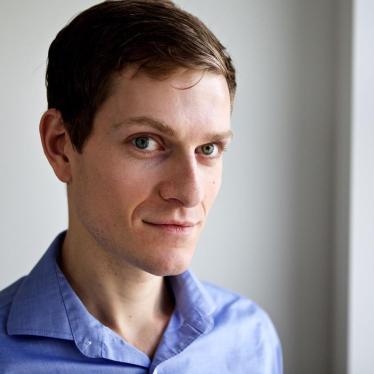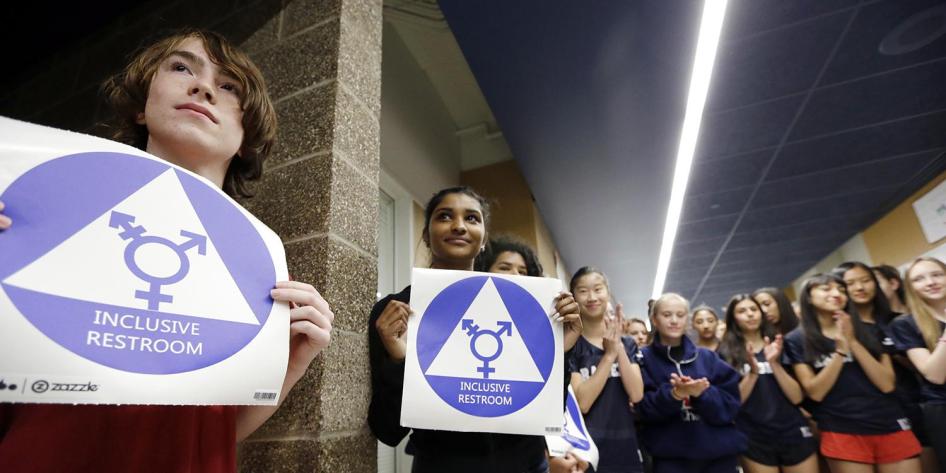In recent months, lesbian, gay, bisexual, and transgender (LGBT) rights have faced significant setbacks in many countries, with populist and authoritarian governments passing draconian laws curtailing LGBT rights.
Countries as varied as Uganda, Ghana, Iraq, Russia, Hungary, and the United States, among others, have sought to limit the fundamental freedoms of expression, association, and assembly of LGBT people. And they have done so by suggesting that the mere existence of LGBT people in the public sphere poses a threat to children, misusing the rhetoric of protecting children to restrict fundamental human rights.
This tired and offensive stereotype is damaging for LGBT people, who are demonized in the public imagination and deprived of fundamental human rights. It also harms all children, who are deliberately kept in the dark about important topics in the world around them ranging from family diversity to current events to comprehensive sexuality education. But most of all, these laws harm LGBT children, who are made to feel alone and kept from seeing how they might flourish as they grow up.
Many of the laws that pretend to protect children are downright draconian. Uganda enacted its Anti-Homosexuality Bill in 2023 under the guise of “protecting children and youth.” In actuality, the law did nothing to address very real concerns that children face in Uganda – for example, high rates of poverty, child labor, and barriers to education and health care – but used that justification instead to curtail the private lives of LGBT adults. This included making consensual same-sex activity among adults punishable with life in prison, imposing the death penalty for “aggravated homosexuality,” and making LGBT advocacy a crime punishable with up to 20 years in prison.
Legislation passed by Ghana’s Parliament similarly purports to “provide for the protection and support of children” with wildly repressive restrictions. The bill would criminalize LGBT advocacy campaigns deemed to be aimed at children with up to 10 years in prison, but goes far further in criminalizing the formation and support of LGBT organizations more generally and – in a particularly extreme provision – the mere fact of identifying as LGBT.
And Russia, which years ago banned positive or even neutral portrayals of LGBT people that might be seen by children, subsequently expanded that ban and effectively prohibited any acknowledgement of LGBT people or rights in public life. Russia’s laws have not only been used to intimidate, harass, and punish LGBT people and organizations and encourage discrimination, but have cut off education and health services for LGBT children to the detriment of their mental health and well-being. The situation worsened in 2024 when Russia’s Supreme Court declared LGBT activism “extremist,” with prison time and other penalties simply for belonging to an LGBT organization.
Other countries have taken similar steps down this path. Hungary has cracked down on depictions of LGBT people in the media, including a law that bans depictions of LGBT people in educational materials or television programs aimed at youth. In 2024, it adopted absurd new regulations restricting where and how toys like rainbow blocks can be marketed and sold.
In the United States, too, lawmakers have insisted they are protecting children as they zealously pass laws that make children’s lives harder. Like Russia or Hungary, seven states limit or ban discussions of sexual orientation and gender identity in schools, and four more restrict whether and how same-sex activity can be discussed in schools. These laws are passed to prevent children learning about diverse sexual orientations and gender identities, with little regard for the harmful effects that isolation and invisibility can have on young people who do or will identify as LGBT.
Many other laws have been passed under the pretext of safeguarding cisgender, heterosexual youth that unjustly target and stigmatize transgender children, denying them access to sports, barring them from appropriate facilities, and outing them to family members. Nearly half of US states prohibit transgender children from obtaining gender-affirming medical care, which is often lifesaving care that alleviates gender dysphoria and helps many to feel comfortable in their bodies. These bans are similarly passed with an almost singular focus on children who might someday decide that they are not transgender, with little regard for the many transgender children and adults who need access to this care and whose lives will be made much more difficult and painful without it.
Thousands of LGBT youth and their families have testified to lawmakers that these bills do immediate and demonstrable harm. And this is supported by data – a poll from the Trevor Project in 2023 found that 71 percent of LGBTQ youth polled and 86 percent of transgender and nonbinary youth reported that laws restricting their rights had adversely affected their mental health. Although children are telling us that these laws are unfair and stigmatizing, lawmakers are not listening.
LGBT children have the same needs for safety, privacy, health, education, and a sense of belonging as other children do, and governments are consistently failing them. What would law and policy look like if we prioritized the needs of all children?
One guiding principle from international human rights law is a concern for the best interest of the child – and not only cisgender, heterosexual children, but LGBT children as well. Viewed through that more holistic lens, many recent laws and policies are insufficient at best and discriminatory at worst.
LGBT children deserve the same rights and opportunities as their cisgender, heterosexual counterparts. Governments should safeguard their well-being with inclusive curricula, resources and support, and access to quality health care. By acknowledging and supporting LGBT children, we can dismantle discriminatory attitudes and foster a more inclusive society for all children to have access to thoughtful care that meets their needs.
This essay is part of a series marking the 20th anniversary of the LGBT rights program at Human Rights Watch. The collection of articles explores the multifaceted challenges LGBT people face globally. Find them here.









